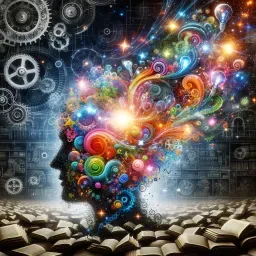”Anyone who has never made a mistake
has never tried anything new“

0
0
0
0
- Meaning
- The phrase emphasizes the philosophical idea that to engage in exploration and creativity necessitates the acceptance of failure. It reflects a psychological understanding that risk-taking is essential in the processes of learning and growth. Historically, it relates to the human experience, showcasing how all progress is borne out of trial and error, underscoring the importance of courage in pursuing new challenges.
- Allegory
- The climbing figure represents the human spirit's pursuit of knowledge and experience, emphasizing that each misstep is part of the journey to the top. The mountain symbolizes challenges faced in life, while the sunlight breaking through the clouds signifies hope and rewards that follow perseverance. The flag at the summit embodies the ultimate success that comes from learning through mistakes, and the flourishing landscape portrays the beauty that accompanies this process.
- Applicability
- In personal life, this phrase can inspire individuals to embrace challenges without fear of failure. It encourages taking risks, trying new experiences, and understanding that mistakes are stepping stones to success rather than endpoints.
- Impact
- This phrase has had a substantial impact on culture and education, motivating individuals in their personal and professional lives. It's often quoted in motivational speeches, educational seminars, and self-help literature, becoming a mantra for encouraging resilience.
- Historical Context
- Although the exact date of this quote is not pinpointed, it is commonly attributed to the 20th century, during Einstein’s active years as a public figure and a scientist (1920s-1950s). The quote reflects post-World War II sentiments, emphasizing innovation and the necessity for progress.
- Criticisms
- Criticism may arise from interpretations that equate failure with success too simplistically. Opponents might argue that not all mistakes lead to meaningful learning experiences. Furthermore, the fear of making mistakes can paralyze some individuals, leading to inaction rather than motivation. Proponents, however, argue that this fear should be overcome for true progress to occur.
- Variations
- Variations of this phrase exist across different cultures, emphasizing the importance of persistence and resilience. For example, in Japanese culture, there's a proverb: "Nana korobi ya oki," which translates to "Fall seven times, get up eight," stressing perseverance in the face of failure.
-

You never fail until you stop trying.
-

Logic will get you from A to B. Imagination will take you everywhere.
-

A person who never made a mistake never tried anything new.
-

I have no special talent. I am only passionately curious.
-

The true sign of intelligence is not knowledge but imagination.
-

Try not to become a man of success, but rather try to become a man of value.
-

Great spirits have always encountered violent opposition from mediocre minds.
-

The important thing is not to stop questioning. Curiosity has its own reason for existing.
-

The difference between genius and stupidity is that genius has its limits.
-

We cannot solve our problems with the same thinking we used when we created them.
No Comments